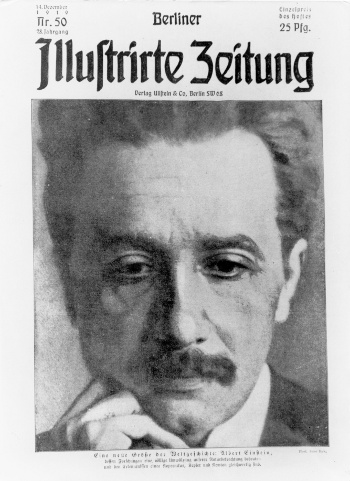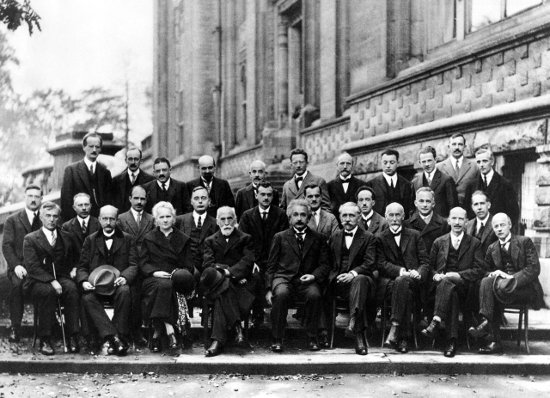
The twentieth century has brought about two major scientific revolutions -- the theory of relativity and quantum mechanics -- which have challenged our understanding of such basic things as space, time, and the process of observation itself. For instance, Einstein's theories of relativity (special and general) showed that space and time can no longer be considered separately; rather, they are inextricably linked into one continuum called space-time.
Space-time itself was transformed from an unchanging background into a major player in cosmic events. Given the magnitude of these ideas, it is not surprising that a photo of Einstein appeared on the cover of the Berliner Illustrirte Zeitung of Dec. 14, 1919, and the caption described him as "a new great figure in world history," whose concepts of nature are "on a par with the insights of a Copernicus, a Kepler, and a Newton" (Figure 1). Unfortunately, the word "relativity" that identifies Einstein's bold achievements has at times been used in popular texts more in the sense of "relativism," implying that a unique physical truth does not exist. In another common misinterpretation in popular parlance, "relativity" was taken to mean that everything we'll ever know about the cosmos is in the eye of the beholder.

Figure 1. Photo of Einstein in a German magazine in 1919. Reproduced with permission of Ullstein Bild/The Granger Collection, New York.
In fact, nothing can be further from the truth. Relativity has indeed demonstrated that we do need to specify the reference frame from which we are observing phenomena, but once that is specified, our subjective human perspective plays no role in the obtained result. Moreover, the theory has shown that whichever frame of reference we choose, we deduce the same "laws of nature."

Figure 2. The participants of the 1927 Solvay Conference on Quantum Mechanics. Founders of quantum mechanics such as Planck, Einstein, Schrödinger, Heisenberg, Dirac, Pauli, Born, Bohr, Curie, and others are among the attendees (from Wikipedia Commons).
Quantum mechanics has produced its own share of misconceptions (Figure 2 shows many of the founders of quantum theory). To be sure, the quantum-mechanical world, which allows particles to be a superposition of an electron and a neutrino, is truly bizarre and counterintuitive. Similarly perplexing is the notion of event probabilities, and the associated outcome that even processes that appear (in classical physics) to be energetically impossible -- such as the penetration of barriers -- can in fact occur with calculable probabilities. But these unexpected features do not mean that quantum mechanics tells us that all the characteristics of our universe, or even those of the subatomic world, are totally indeterminate. or do they mean that everything is uncertain. For instance, subatomic particles have a characteristic called spin -- they behave as if they are spinning tops. This property identifies the equivalent of the direction of a spin axis (the direction chosen so that the axis and the spin correspond to a right-hand screw). According to one of the most famous results of quantum mechanics, Bell's theorem (to be discussed in a future blog), the spin orientation of a subatomic particle is indeterminate before we actually look. That is, prior to performing an observation. This is not the same as being uncertain. The spin orientation is a superposition of possible values with no single value in particular. Bell's theorem simply tells us something about the behavior of the unobserved world.
The key point I would like to convey is that while modern physics has nicely delineated limits to what is knowable, neither the elevation of "uncertainty" to the level of a principle in quantum mechanics, nor the mixture of space and time in relativity, have acted in any way as show-stoppers to knowledge. The opposite is true. Predictions of the theory of relativity and of quantum mechanics have been spectacularly confirmed by detailed experiments and observations. The concepts introduced by both theories are disturbing to our classically trained minds and to our everyday experiences, but if anything, they hint that the universe remains comprehensible.